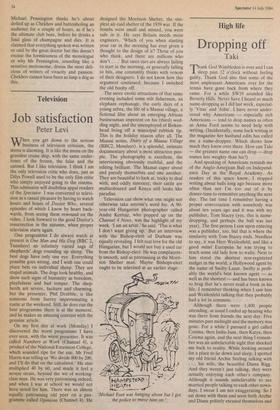Television
Job satisfaction
Peter Levi
When you get down to the serious business of television criticism, the menu is alarming. It is like the menu on the grandest cruise ship, with the same under- tones of the frozen, the false and the canned. But I like television. I think I am the only television critic who does, just as Dilys Powell used to be the only film critic who simply enjoyed going to the cinema. This admission will doubtless appal readers of the Spectator. I was converted to televi- sion as a casual pleasure by having to watch hours and hours of Doctor Who, several episodes of which I know by heart back- wards, from seeing them rewound on the video. I look forward to the good Doctor's resurrection in the autumn, when proper television starts again.
One programme I do always watch at present is One Man and His Dog (BBC 2, Tuesdays) an infinitely varied saga of shepherds' dogs rounding up sheep. The best dogs have only one eye. Everything possible goes wrong, and I wish one could place bets on individual sheep. They are stupid animals. The dogs look healthy, and show such signs of humanity as boredom, playfulness and bad temper. The shep- herds are severe, taciturn and charming, but the presenter, Phil Drabble, is like someone from Surrey impersonating a rustic at the weekend. Still, he does run the best programme there is at the moment, and he makes an amusing contrast with the genuine article.
On my first day at work (Monday) I discovered the worst programme I have ever seen, with the worst presenter. It was called Numbers at Work (Channel 4), a product of the National Extension College, which sounded ripe for the axe. Mr Fred Harris was telling us 'We divide 800 by 200, and I'll do that on the calculator.' He also multiplied 40 by 60, and made it feel a severe strain, beyond the wit of working- class man. He was very patronising indeed; and when I was at school we would not have stood for him. There was an almost equally patronising old peer on a pro- gramme called Opinions (Channel 4). He
designed the Morrison Shelter, the sim- plest air-raid shelter of the 1939 war. If the bombs were small and missed, you were safe in it. He says Britain needs more engineers. 'Which of you when starting your car in the morning has ever given a thought to the design of it? Those of you who think, and there are millions who don't . . .' But since cars are always failing to start in the morning, or generally falling to bits, one constantly thinks with venom of their designers. I do not know how this argument continued, because I switched the old booby off.
The more exotic attractions of that same evening included some stilt fishermen, an elephant orphanage, the early days of a yo'ung zebra, the life of a Maasai village, a fictional film about an emerging African businessman impotent on his (third) wed- ding night, and the unemployed of Birken- head living off a municipal rubbish tip. This is the holiday season after all. The Maasai series, Diary of a Maasai Village (BBC2, Mondays), is a splendid, intimate documentary about a most attractive peo- ple. The photography is excellent, the interviewing obviously truthful, and the editing brilliant. The Maasai caper about and parody themselves and one another. They are beautiful to look at, tricky to deal with, and oddly innocent; their cattle are multicoloured and Kenya still looks like paradise.
Television can show what one might not otherwise take anyone's word for. A 90- year-old Hungarian photographer called Andre Kertesz, who popped up on the Channel 4 News, was the highlight of my week. 'I am an artist,' he said. 'This is what I don't want giving up.' But an interview with the Bishop-elect of Durham was equally revealing. I felt real love for the old Hungarian, but I would not buy a used car from the Bishop-elect. He was complacent- ly smooth, and as patronising as the Morri- son Shelter man. Maybe Bishops-elect ought to be televised at an earlier stage.
'Michael Foot was hanging about but I got the police to move him on.'














































 Previous page
Previous page